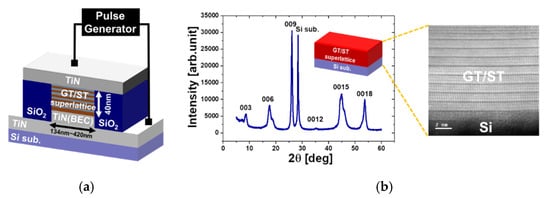The authors and journal retract the article, “Achievement of Gradual Conductance Characteristics Based on Interfacial Phase-Change Memory for Artificial Synapse Applications” [1], cited above.
Following its publication, the authors contacted the editorial office about incorrect use of materials and data used without authorization (as shown in Figure 1, the TEM images, and XRD data used).

Figure 1.
(a) Schematic of the fabricated GeTe/Sb2Te3 (GT/ST) interfacial phase-change memory (iPCM) structure, (b) XRD diffraction pattern of a GT/ST SL (SL) structure and cross-sectional TEM image of the GT/ST superlattice on an Si (111) substrate.
The article [1] describes the use of a superlattice device based on the GeTe/Sb2Te3 material (Figure 1b). The device actually measured Ti-doped material, not GeTe/Sb2Te3 material. Further details were provided by the university that confirmed the extent of the issues described.
This retraction was approved by the Editor-in-Chief of the journal Electronics. The authors would like to apologize for any inconvenience caused to the readers by these changes.
Reference
- Kang, S.; Lee, J.; Kang, M.; Song, Y. RETRACTED: Achievement of Gradual Conductance Characteristics Based on Interfacial Phase-Change Memory for Artificial Synapse Applications. Electronics 2020, 9, 1268. [Google Scholar] [CrossRef]
Publisher’s Note: MDPI stays neutral with regard to jurisdictional claims in published maps and institutional affiliations. |
© 2021 by the authors. Licensee MDPI, Basel, Switzerland. This article is an open access article distributed under the terms and conditions of the Creative Commons Attribution (CC BY) license (http://creativecommons.org/licenses/by/4.0/).